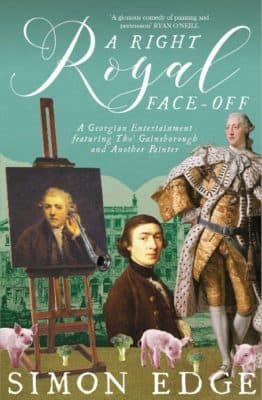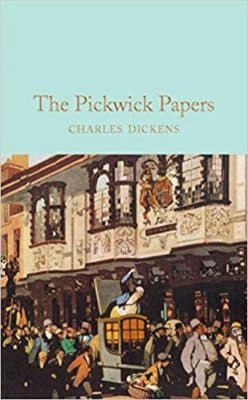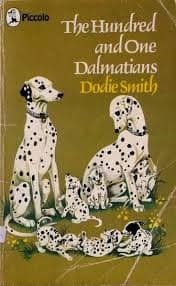Two authors and an actor gave members a fascinating evening on Thursday 24 October.
 Simon Edge is the Sudbury author of ‘A Right Royal Face-Off’, a modern satire based on artists Gainsborough and Reynolds. He began by reminding us of Daniel Defoe’s journey ‘through the East’ and his rather disparaging comment on Sudbury: ‘I know nothing for what this town is remarkable’. A later journey, however, when he approached the town from Nayland, was slightly more optimistic: ‘The town is pretty well built but the streets are dirty’.
Simon Edge is the Sudbury author of ‘A Right Royal Face-Off’, a modern satire based on artists Gainsborough and Reynolds. He began by reminding us of Daniel Defoe’s journey ‘through the East’ and his rather disparaging comment on Sudbury: ‘I know nothing for what this town is remarkable’. A later journey, however, when he approached the town from Nayland, was slightly more optimistic: ‘The town is pretty well built but the streets are dirty’.
Charles Dickens would probably have agreed. Coming to Sudbury as a young journalist, he  stayed at the Swan Hotel, now the NatWest Bank - surely a good case for a Blue Plaque. His many satirical observations of London life had already appeared in his fictional ‘Sketches by Boz’ and it would seem that he continued to find much rich material in Sudbury, basing many of his characters on local people. A well-known miser became ‘Scrooge’ and when ‘the richest commoner in Britain’, Robert Jennens, died at Acton in 1798 leaving £2,000,000 and no clear instructions as to inheritance, it provided Dickens with the plot of his later novel ‘Bleak House’.
stayed at the Swan Hotel, now the NatWest Bank - surely a good case for a Blue Plaque. His many satirical observations of London life had already appeared in his fictional ‘Sketches by Boz’ and it would seem that he continued to find much rich material in Sudbury, basing many of his characters on local people. A well-known miser became ‘Scrooge’ and when ‘the richest commoner in Britain’, Robert Jennens, died at Acton in 1798 leaving £2,000,000 and no clear instructions as to inheritance, it provided Dickens with the plot of his later novel ‘Bleak House’.
The novel ‘The Pickwick Papers’, which was first published as a magazine serial (24 pages a month over a 2-year period) does not actually mention Sudbury by name, instead using the name ‘Eatanswill’ (eat-and-swill) but there are plenty of clues: the descriptions of the market, the High Street and the famously ‘fixed’ elections of the ‘rotten borough’ where election agents arranged for the locking-up of their party members , to be brought out when required to vote – apparently a common practice.
In the novel, the opposition party believes it has won over a larger number of voters by providing their wives and daughters with a gift: ‘Five-and -forty women…and gave every one of ‘em a green parasol when she went away.’ Actor Bryan Thurlow brought this scene, and others, to life with several rumbustious renderings of passages from the novel, particularly the ‘spirited contest’.
Simon Edge then gave us some lesser-known facts on Dodie Smith: a ‘failed’ actress, she had worked in the Art Department of Heal and Sons Furniture Store in London and had had an affair with the owner. She first had enormous success as a playwright with, in particular, ‘Autumn Crocus’ (1931) which prompted the newspaper headline, ‘Shopgirl Writes Play’ and another famous play ‘Dear Octopus’(1938).
 Simon reminded us of Dodie’s story ‘101 Dalmatians’ when the travelling dogs ‘come to the market town of Sudbury’ and ‘crossed the bridge over the River Stour’, and he remarked on her neat descriptions: ‘The caravans barked, but the dogs moved on.’
Simon reminded us of Dodie’s story ‘101 Dalmatians’ when the travelling dogs ‘come to the market town of Sudbury’ and ‘crossed the bridge over the River Stour’, and he remarked on her neat descriptions: ‘The caravans barked, but the dogs moved on.’
When living comfortably near Finchingfield, Dodie owned a RollsRoyce but later sold it because ‘it wasn’t suitable for Sudbury’.
A photograph on the screen could not be identified by anyone: it was Jonathan Gash, the creator of the ‘LoveJoy’ novels which became a popular TV series, filmed in and around Sudbury and Long Melford: Lovejoy was apparently appreciative of his surroundings: ‘Those two nights at the Mill Hotel…were the happiest of my life.’
Liz Trenow, born and bred in Sudbury, is a member of the Walters family which has been weaving silk in Sudbury for over 300 years. Her four novels are set within the silk-weaving industry, both past and present. Her first novel, ‘The Last Telegram’ is located in and around Sudbury with many easily-recognisable locations. The story is based in the Walters weaving sheds during the Second World War and much of her material is rooted in real-life events: her father supported the transport of children out of war-torn Germany (The Kindertransport) and eventually employed four of them in the mill as weaving apprentices. Reading from her novel, she described ‘distant looms like the low hum of bees,’ and when handling the ‘rustle and squeak’ of silk fabric: ‘(it) allowed the silk to seduce me.’
Audience participation at the end of the talk brought forth reminiscences of other well-known Sudbury authors: Adrian Bell, who wrote on farming practices and compiled the Times crossword for many years; US Serviceman Robert Arbis on wartime Sudbury life, ‘Here We Are Together’ and ‘The Mathematics of Love’ by Emma Darwin, a modern chronicle of two lives set in Kersey.
Who knew just how much fiction has been written about our town and its surroundings? It certainly came as a pleasant surprise and made for a most enjoyable evening.
A Mackman Group collaboration - market research by Mackman Research | website design by Mackman